Hatten Sie schon einmal Probleme mit Ihrer WordPress-Website, konnten aber nicht auf den Admin-Bereich zugreifen, um die Probleme zu beheben? Dies ist eine frustrierende Erfahrung, die viele Benutzer von WordPress irgendwann machen.
Eine gängige Problembehandlung besteht darin, alle Plugins zu deaktivieren und sie dann nacheinander wieder zu aktivieren. So lässt sich feststellen, ob ein Plugin-Konflikt die Ursache des Problems ist. Aber was tun Sie, wenn Sie sich nicht einmal bei wp-admin anmelden können, um diesen wichtigen Schritt durchzuführen?
Keine Sorge, es gibt eine Lösung. In dieser Anleitung zeigen wir Ihnen, wie Sie alle WordPress Plugins deaktivieren können, wenn Sie aus Ihrem Admin-Bereich ausgesperrt sind.
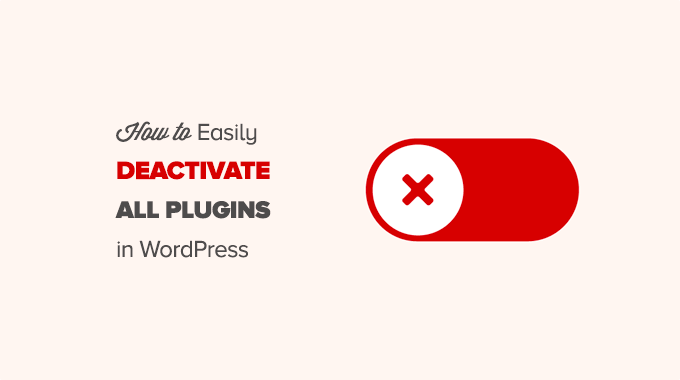
Es gibt zwei gängige Methoden, um Plugins zu deaktivieren, ohne auf den Admin-Bereich Ihrer WordPress-Website zuzugreifen. Sie können die Methode wählen, die Ihnen einfacher erscheint:
Methode 1: Deaktivieren Sie alle WordPress-Plugins per FTP
Für diese Methode müssen Sie entweder einen FTP-Client oder die Dateimanager-App in Ihrem WordPress-Hosting-Kontrollpanel verwenden.
Wenn Sie noch nie mit FTP gearbeitet haben, sollten Sie sich unseren Leitfaden zum Hochladen von Dateien in WordPress mit FTP ansehen.
Zunächst müssen Sie mit einem FTP-Client oder dem Dateimanager im cPanel eine Verbindung zu Ihrer Website herstellen. Sobald Sie verbunden sind, müssen Sie zum Ordner /wp-content/ navigieren.
Innerhalb des Ordners wp-content finden Sie einen Ordner namens plugins. Hier speichert WordPress alle Plugins, die auf Ihrer Website installiert sind.
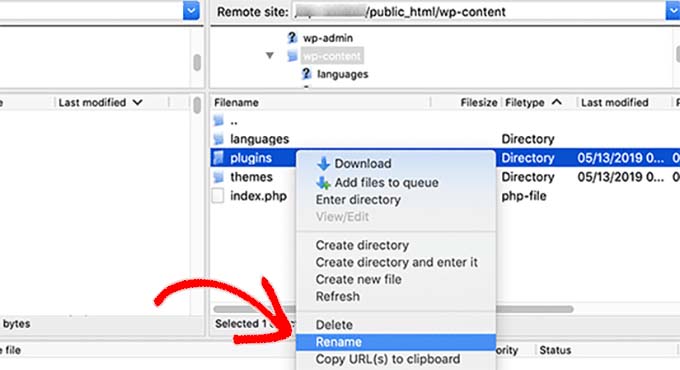
Klicken Sie mit der rechten Maustaste auf den Plugins-Ordner und wählen Sie “Umbenennen”.
Als Nächstes ändern Sie den Namen des Ordners nach Belieben. In unserem Beispiel werden wir ihn plugins.deactivated nennen.
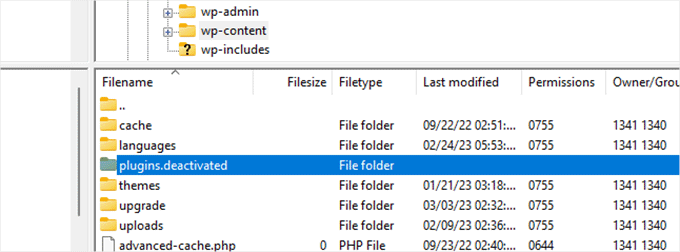
Sobald Sie dies tun, werden alle Ihre Plugins deaktiviert.
Das liegt daran, dass WordPress nach einem Ordner namens “Plugins” sucht, um die Plugin-Dateien zu laden. Wenn es den Ordner nicht findet, deaktiviert es automatisch die aktiven Plugins in der Datenbank.
Diese Methode wird in der Regel verwendet, wenn Sie aus Ihrem Verwaltungsbereich ausgesperrt sind. Wenn das Problem mit Ihren Plugins zusammenhängt, sollten Sie sich in den WordPress-Administrationsbereich einloggen können.
Wenn Sie die Seite Plugins ” Installierte Plugins im WordPress-Administrationsbereich besuchen, sehen Sie Benachrichtigungen für alle Plugins, die deaktiviert wurden.
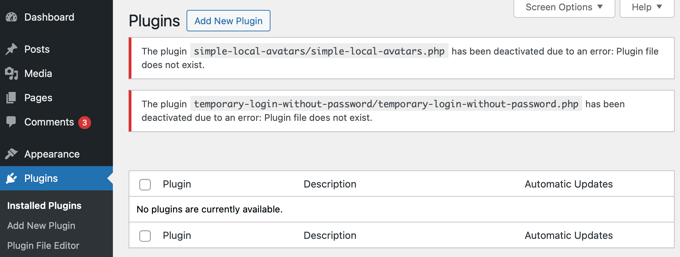
Sie werden auch feststellen, dass alle Ihre Plugins jetzt verschwunden sind. Keine Sorge, sie sind alle sicher, und Sie können sie leicht wiederherstellen.
Wechseln Sie einfach wieder zu Ihrem FTP-Client und gehen Sie zum Ordner /wp-content/. Von hier aus müssen Sie den Ordner ” plugins.deactivated ” wieder in "plugins" umbenennen.
Nun können Sie zur Seite Plugins ” Installierte Plugins im WordPress-Administrationsbereich zurückkehren und ein Plugin nach dem anderen aktivieren, bis Ihre Website wieder funktioniert.
Jetzt wissen Sie genau, welches Plugin das Problem verursacht hat. Sie können dann den Ordner dieses Plugins per FTP von Ihrer Website löschen oder den Autor des Plugins um Unterstützung bitten.
Methode 2: Deaktivieren Sie alle Plugins mit phpMyAdmin
Die FTP-Methode ist unserer Meinung nach definitiv einfacher. Sie können aber auch alle WordPress-Plugins mit phpMyAdmin deaktivieren.
Wichtig: Bevor Sie irgendetwas tun, machen Sie bitte eine vollständige Datenbanksicherung. Dies wird sich als nützlich erweisen, wenn etwas schief geht.
Als nächstes müssen Sie sich bei Ihrem Webhosting-Dashboard anmelden. In diesem Beispiel zeigen wir Ihnen ein cPanel-Dashboard. Das Dashboard Ihres Hosting-Kontos kann anders aussehen.
Klicken Sie auf das Symbol “phpMyAdmin” unter dem Abschnitt Datenbanken.
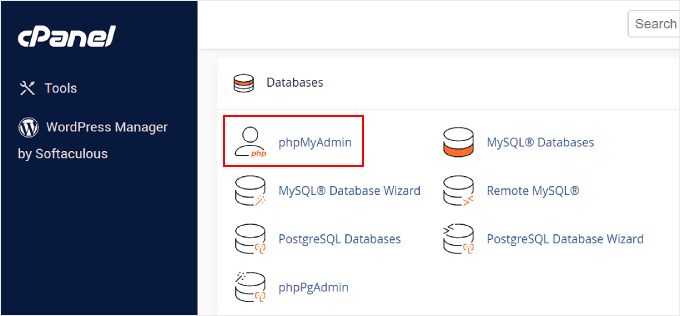
Dadurch wird phpMyAdmin in einem neuen Browserfenster gestartet.
Sie müssen Ihre WordPress-Datenbank auswählen, wenn sie nicht bereits ausgewählt ist. Danach können Sie die WordPress-Datenbanktabellen sehen.
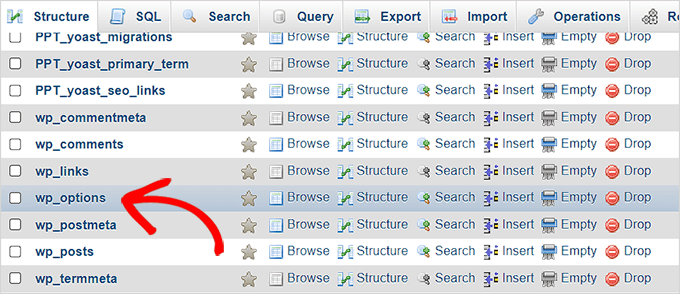
Wie Sie sehen können, haben alle Tabellen in der Datenbank das Präfix wp_ vor dem Tabellennamen. Ihre Tabellen können ein anderes Datenbankpräfix haben.
Sie müssen auf die Tabelle wp_options klicken. In der Tabelle wp_options sehen Sie Zeilen mit verschiedenen Optionen. Suchen Sie die Option “active_plugins” und klicken Sie dann auf den Link “Bearbeiten” daneben.
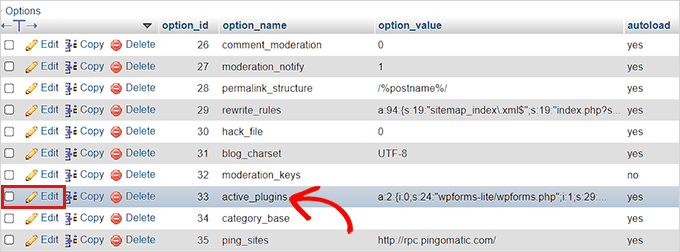
Auf dem nächsten Bildschirm müssen Sie das Feld option_value in a:0:{} ändern.
Klicken Sie dann auf die Schaltfläche “Go”, um Ihre Änderungen zu speichern.
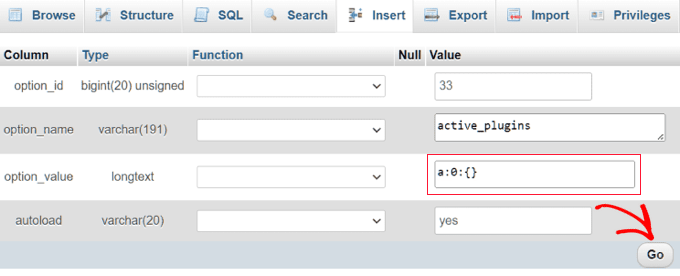
Sie haben alle WordPress-Plugins mit phpMyAdmin erfolgreich deaktiviert. Wenn ein Plugin Sie daran gehindert hat, auf den WordPress-Admin zuzugreifen, dann sollten Sie sich jetzt anmelden können.
Video-Anleitung
Expertenanleitungen zu WordPress-Plugins
Wir hoffen, dass dieser Artikel Ihnen geholfen hat, alle Plugins in WordPress zu deaktivieren. Vielleicht interessieren Sie sich auch für einige andere Anleitungen zur Problembehandlung von WordPress Plugins:
- Was sind WordPress-Plugins? Und wie funktionieren sie?
- Wie man WordPress-Plugins einfach deaktiviert (Anleitung für Anfänger)
- Wie man WordPress-Plugins von der Datenbank aus aktiviert/aktiviert
- Verlangsamen inaktive Plugins WordPress? Sollten Sie sie löschen?
- Wie viele WordPress-Plugins sollten Sie installieren? Was ist zu viel?
- Ist es sicher, veraltete WordPress-Plugins zu verwenden? (Erläutert)
- Sollten Sie Plugins installieren, die nicht mit Ihrer WordPress-Version getestet wurden?
- Wie man WordPress-Plugins richtig aktualisiert (Schritt für Schritt)
- Sollte ich zuerst WordPress oder Plugins aktualisieren? (Richtige Update-Reihenfolge)
Wenn Ihnen dieser Artikel gefallen hat, dann abonnieren Sie bitte unseren YouTube-Kanal für WordPress-Videotutorials. Sie können uns auch auf Twitter und Facebook finden.





ARoibal
I am really thankful that you posted this article. I had no idea how to fix the problem and in my case it was a plugin. Thank you!!!!
Robb Dearth
I usually don’t comment on posts like this, and I know this post is insanely old (by today’s standards) but I just wanted to thank you for this quick fix. I was able to access the /plugins folder via Media Temple’s file manager, change the folder name, and target the problem plugin… THANK YOU!!!
Cindy
I could not get into my blog at all to edit anything. I followed your directions on deleting a plug-in. That fixed it. Thank you for the info and for explaining it in a way that is easy to understand!!
WPBeginner Support
Thanks, glad you found it helpful.
Admin
Jairo Levi
Super! I was able to fix my site by renaming the Plug ins folder, then re activating the plug ins one by one.
Just wanted to say thank you!
Jairo.
WPBeginner Support
You are welcome
Admin
Dennis
Hello thanks so much for the article,
i was developing my wordpress offline using wampserver localhost.
When i finished it worked just fine on my localhost but after uploading it i started having the issue, only the index page could load and every other page still have the offline url ( that is localhost/mysite/thepost) when i manually change the localhost url to the normal url it ought to be, i gets a 500 Internal Server Error.
I’ve tried all method mentioned here but my problem persist.
Please I really Need help.
Thanks so much.
Franck
Great article! saved me a headache. Had to go through the whole process but was worth it. Now my site is back and everything up to date. Great job guys!
Paolo Euvrard
Great info, it worked!!!
Cheers
maros
ssh:
debian@otherland:*/wp-content/plugins$ sudo chown root:root menu-icons/
debian@otherland:*/wp-content/plugins$ sudo chmod -R 700 ./menu-icons/
debian@otherland:*/wp-content/plugins$
then I reloaded “tab with server error 500” and it said to me something like plugin deactivated …files not found.
Brian H
Try clearing your cookies and cache, then see if you can get into the admin panel/dashboard
Lesley Parolis
Thanks very much. It was really helpful. Deactivating the plugins solved the problem. There was one plugin which was causing the white out.
Richard
Hi. I’ve renamed the plugin folder to plugin.deactivate but still have the white screen. I was so hoping I could fix my problem as quickly and easily as other have but not as yet. Any other suggestions? Many thanks.
WPBeginner Support
Switch to a default theme. You can also try deleting your .htaccess file.
Admin
Dwayne
Nice article. If you know which plugin is causing the problem, can you disable just that plugin from the DB?
Sue Cloutier
Yes…in the your file manager. Just did it successfully-no white death screen
brian h
You can actually do this with the theme directory as well. This is what I had to do as I had both issues, plugins behaving poorly AND a theme issue that locked me out.
Renamed themes to themes.deactivate and it let me back in to theme management which was keeping me from going any further than dashboard PERIOD.
Once in there it told me what theme caused the issue in detail but I still had to recreate a new directory called “themes” and copy the good themes over to it before it would let me activate a new theme!
Hope this sheds some light on possible additional errors
Brian:
Al Betancourt
Thank You! for the instructions I was able to deactivate the plug-in causing the problem
Alexsandro
Thank you very much! It works!
Teejax
Hi,
Thanks for the good job.
I run WordPress on a self-hosted IIS via virtual machine.
Unfortunately I could not rename my plugins folder, I kept getting “folder in use”
What do I do?
Thanks in advance.
John Wiley
Turn off the World Wide Web Publishing Service while you rename the folder. IIS is reading and locking that folder open.
Haywhy blaze
how?
Fareena
Hi pls help! I have a blog on the free wordpress.com as such there is no independenthost but wordpress itself. I m unable to log on to the backend dur to 2 step authentication plugin on wordpress.
Im trying to connect to my WP page via ftp can ypu pls confirm whether the username and password for ftp access is the same as my wordpress username password ? . At this stage I’m unable to acesss the backend and keep getting a could not connect to server error.
I am trying to disable the 2 step authentication plugin for my site. As I no longer have the mobile sim it’s sending the verification code to. Pls help out as I’m pretty frustrated. Cheers
WPBeginner Support
Please contact WordPress.com support.
Admin
jean jacques amani
please help me!
there is 4 days i can access my wp pannel even by FTP using filezila.
day before i open my wp pannel and saw one plugin need an update. i’ve did the automatical updade and since my website don’t pass.
i can’t access the directory to deactive the plugin.
i’ve followed the step you said using phpMyAdmin but can’t find “active plugin” in wp-option
please help me
WPBeginner Support
Contact your web host to find out why you can’t access FTP. You can also access your files and folders using the file manager in cPanel (Your web hosting account dashboard).
Admin
jean jacques amani
first i have to thank you for your assistance.
I’m using a free mode in my web host and this don’t allows me to interract with them.
when i try to open my website in the browswer i get this message:
Warning: require_once(assets/ilenframework/assets/lib/utils.php): failed to open stream: No such file or directory in /home/u673270787/public_html/wp-content/plugins/yuzo-related-post/yuzo_related_post.php on line 24 Fatal error: require_once(): Failed opening required ‘assets/ilenframework/assets/lib/utils.php’ (include_path=’.:/usr/lib/php’) in /home/u673270787/public_html/wp-content/plugins/yuzo-related-post/yuzo_related_post.php on line 24
Pesa
Great Article. Saved a lot of time troubleshooting and fixing my site. Keep up the good job.
Lohith
Thanks a lot.. Your article did the miracle to my WordPress site which suddenly went blank
Carla
I know my white screen came from a bad plugin and everything went sideways when I tried to uninstall it from wp-admin. Now I’m getting the white screen and the plugin is not showing up in my cPanel….what now?
Squalle
Huge help for me this morning! I hadn’t been on my admin panel in a few days. I open it up and selected all the plugin updates and updated them all at once… big mistake. Got the WSOD and started freaking out. lol
Then I found this article which helped immensely! Worked like a charm. I found the bad plugin and deleted it.
Thanks for the great article!
Muhammad Awais Sarwar
I have a same problem. I can open dashboard of wordpress and also home page. But when I open any other page it says This webpage has a redirect loop
ERR_TOO_MANY_REDIRECTS
I remmber I only delete 2 plugins. I didn’t any update. But it remains. Kindly guide me.
WPBeginner Support
If you have tried deactivating all your WordPress plugins, then try this.
Connect to your website using an FTP client. In the root directory you will find a .htaccess file. Download it to your computer. Delete the original file from your website. Visit your site’s admin area and go to Settings » Permalinks. Do not change any settings on the page, just click on the save changes button. Check your website to see if the error has resolved.
Admin
Muhammad Awais Sarwar
Thank you for you kind reply.
I solved the problem last night after post here.
”
This is the solution and how to fix it:
In our wp-config.php, we overwrite the given server-variables that cause the problem by adding this below your database-configuration in wp-config:
if(isset($_SERVER[‘HTTP_X_FORWARDED_FOR’])) {
$list = explode(‘,’,$_SERVER[‘HTTP_X_FORWARDED_FOR’]);
$_SERVER[‘REMOTE_ADDR’] = $list[0];
}
$_SERVER[ ‘SERVER_ADDR’ ] = DOMAIN_CURRENT_SITE;
$_SERVER[ ‘REMOTE_ADDR’ ] = DOMAIN_CURRENT_SITE;
$_SERVER[ ‘HTTP_HOST’ ] = DOMAIN_CURRENT_SITE;
”
I saw this link.
You all can visit it. Thank God, I was trying for three days. Thank you all of you.
Martin Fuller
Hi, I ran into this problem today. I knew the name of the plugin causing the problem and engaged a consultant.
He had access to my cPanel. Somhow he was able to deactivate the problem plugin but would not tell me how he did it.
Do you have any idea how he might have done it?
WPBeginner Support
Please see the article above, it has full instructions.
Admin
Elaine
Thank you. I installed a bad plug-in updated and got the white screen of death. Your clear explanation helped me restore the correct plug-ins and regain access to my site.
Rhyauna
I followed all of the steps and was able to deactivate my plugins, but when I tried to activate them again, it gave me a white screen. Not sure whats going on. Please help
WPBeginner Support
You can rename the plugin folder to deactivate all plugins again. Create a new plugins folder under /wp-content/ and then download and install fresh copies of all your plugins.
Admin
Daniel
Thanks a bunch, this worked directly. Was afraid it would not work.
MagK
When I got the “white screen of death”, I did not even panic for a minute and instead went straight to your site, I knew I would find a solution here.
Thank you very much for all the advice and resources you make available.
WPBeginner Support
You are welcome. Thanks for your kind words.
Admin
Bhushan S. Jawle
Thanks a LOT ! Saved hours of work !
cherian
Thank you
I renamed Lock down WP Admin folder and Its working fine now
Thank You
yaser
thank you so mach!
i was sad and you made me happy.
my site is now UP!
Tami
Thank you! Super helpful!
mike rigley
Thanks – killing the plugins folder via FTP worked great for me Now I can update them and reactivate if needed
Now I can update them and reactivate if needed 
thanks
mike
Nick Karvounis
OMG! You saved my day, I had installed a security plugin that only allowed me to login from a specific IP address and I could not log in through FTF, thank you for the php access instructions!
Saurabh Gupta
Brilliant writeup, simple and easy. Our environmental blog Earth5R had this critical problem where authors and admin could not log it, applied this solution and it worked like magic. There was one of the few unnecessary plugins that was causing the problem. That also bring a lesson, keep only the most necessary plugin! Thanks a lot, that was such a time save.
Femke
Help! I am in the FTP file, but I really don’t know how to change te name of the folder..
WPBeginner Support
In your FTP client, click to select the plugins folder and then right click and select Rename from the menu.
Admin
Yann
Thank you guys for the FTP tip. I am a beginner and you just saved me many stressful hours.
hyma
Wow Tq Manuel, Saved my time, helps me a lot.
Manuel
Thank you very much for this useful post!
Jonathan
Thanks! I could get to my wordpress site, but not into the admin area. I got a fatal error because of a cache plugin. I did this to get it to the admin, deleted and reinstalled the plugin, and it’s working fine.
Paul
Thanks – saved hours of rework!
Yarina
None of this worked for me… but then I switched to Internet Explorer and now I can access my wp dashboard. The site has always been live. Any ideas of what could be causing the issue in Chrome?
Chris
Thank you. Problem was a bad plugin upgrade. Using FTP and changing plugin directory name, instantly gave back my ability to get to the wp-login page, then change the plugin directory back again via FTP allowed me to re-activate plugins in turn, thereby identifying the dodgy plugin easily. This was incredibly helpful and resolved my problem. Thanks you.
lynn Page
if you know how to fix this i need help
Ron Blake
Great article. Thank you! Bad plug-in and using the plugin.deactivate rename was a lot easier than trying to do it through the admin panel.
John Detlefs
You. Rock. This article just made me a couple of grand and saved me from having to redo a week’s worth of work. Thankyou very much!
Specifically, changing debug to “True” made life a whole lot easier.
Javier Mayen
wp-super-cache plugin put my screen in white and death. thank you this article give me the solution
Ashley
Someone can help me please i did this through my FTP but i still have the “reauth=1 ” after that i deactivate my plugins folder. Thank You
Shawn
If you’re running WP-CLI, you can also do this by running:
wp plugin deactivate –all
Crystal Foth
Thanks – just saved me. Should have deactivated plugins before theme switch!
flafin
Great post, thank you!
I got an Internal Server Error while trying to add tracking code to my functions.php file through the editor on WP. After getting the error I removed the code from the file, which should have fixed it, but I still had the error. I opened the file manager in my hosting account and navigated to the functions.php file. When I opened it the code that caused the error was still in the file. Once I removed the code the error went away. Hope this helps.
anticrap
amazing. i’m a complete novice at all of this and you made it so easy to sort out this problem. thank you so much
Chris
i tried both and it worked for me, the problem now is i can’t activate my plugins..
Nate
Did you figure out how to reactivate them? I’m having the same issue. Let me know. Thanks.